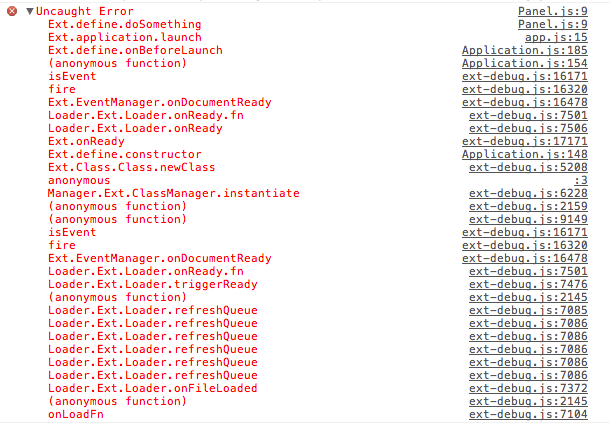一步一步翻译,解说extjs4-------------Class System
Class System
在其历史上的第一次,Ext JS的经历了一次巨大的重构。几乎每一个类都被重写,因此,在开始写代码之前很好的理解各类是很重要的。
本手册适用于任何的开发者,它分为4个部分:
-
第一节:“概述”:描述一个强大的类系统
-
第二节:“命名约定”:怎么更好的命名类,方法,属性,变量和文件。
-
第三节:“动手”:提供了详细的一步一步的代码示例
-
第四节:“错误的处理和调试”:提供有用的提示和技巧,如何处理异常
I. 概述
Ext JS 4有300多个类。有一个超过20万来自世界各地开发者的用户社区。在同一个框架下,我们面对着一荐巨大的挑战(共同的代码架构)
-
熟悉和简单易学
快速开发,调试方便,无痛部署
精心组织,可扩展性和可维护性
II.命名约定
对类,命名空间,文件名使用统一的命名命名约定,有利于对代码的组织,结构化和更有可读性
1) 类
类名可能只包含字母数字。数字是可以,但大多情况下不鼓励使用,除非是技术术语,同样的不要使用下划线,连接线和非字母数字字符。例如:
-
MyCompany.useful_util.Debug_Toolbar 不鼓励 -
MyCompany.util.Base64可以
MyCompany.data.CoolProxy MyCompany.ApplicationMyCompany.form.action.AutoLoad2) 源文件
一个类一个文件,类名和文件名相同。例如:
-
Ext.util.Observableis stored inpath/to/src/Ext/util/Observable.js -
Ext.form.action.Submitis stored inpath/to/src/Ext/form/action/Submit.js -
MyCompany.chart.axis.Numericis stored inpath/to/src/MyCompany/chart/axis/Numeric.js
3) 方法和变量
和类名相同,方法和变量名可能只包含字母数字字符。数字是允许的,但在大多数情况下不鼓励,除非他们属于一个技术术语。不要使用下划线,连字符,或任何其他非字母数字字符。方法和变量名应该总是在驼峰。这也适用于首字母缩写。
例子:
可以接受的方法名称:encodeUsingMd5()getHtml(而不是getHTML())getJsonResponse(),而不是getJSONResponse(),而不是ofparseXMLContentparseXmlContent()
可接受的变量名:VARisGoodNameVARbase64EncoderVAR的XmlReaderVARhttpServer
4) 属性
- 类的属性名遵循完全相同的公约,除上面提到的方法和变量的情况下,当是静态常量,静态类属性是常量应全部大写。例如:
-
-
Ext.MessageBox.YES= "Yes" -
Ext.MessageBox.NO= "No" -
MyCompany.alien.Math.PI = "4.13"
-
III. 动手
1. 声明
1.1) 老方式
If you have ever used any previous version of Ext JS, you are certainly familiar withExt.extendto create a class:
var MyWindow = Ext.extend(Object, { ... });
My.cool.Window = Ext.extend(Ext.Window, { ... });
在这个例子中,我们命名了继承自Ext.Window的新类。我们需要解决两个问题:
Ext.ns('My.cool'); My.cool.Window = Ext.extend(Ext.Window, { ... });1.2) 新方式
Ext JS 4 提供了Ext.define方式创建类.例如:
Ext.define(className, members, onClassCreated);-
className: 类名 -
members:键 - 值对的集合 -
onClassCreated:类创建好后的回调函数
Example:
Ext.define('My.sample.Person', {
name: 'Unknown',
constructor: function(name) {
if (name) {
this.name = name;
}
return this;
},
eat: function(foodType) {
alert(this.name + " is eating: " + foodType);
return this;
}
});
var aaron = Ext.create('My.sample.Person', 'Aaron');
aaron.eat("Salad"); // alert("Aaron is eating: Salad");
2. 配置
在Ext JS 4中我们声明了config属性,在创建实例前由EXt.Class处理
- 配置是完全封装其他类成员
- 对config属性中的成员自动创建getter,setter,apply方法
下面是一个怎么使用的例子Ext.define('My.own.Window', { /** @readonly */ isWindow: true, config: { title: 'Title Here', bottomBar: { enabled: true, height: 50, resizable: false } }, constructor: function(config) { this.initConfig(config); return this; }, applyTitle: function(title) { if (!Ext.isString(title) || title.length === 0) { alert('Error: Title must be a valid non-empty string'); } else { return title; } }, applyBottomBar: function(bottomBar) { if (bottomBar && bottomBar.enabled) { if (!this.bottomBar) { return Ext.create('My.own.WindowBottomBar', bottomBar); } else { this.bottomBar.setConfig(bottomBar); } } } });
var myWindow = Ext.create('My.own.Window', {
title: 'Hello World',
bottomBar: {
height: 60
}
});
alert(myWindow.getTitle()); // alerts "Hello World"
myWindow.setTitle('Something New');
alert(myWindow.getTitle()); // alerts "Something New"
myWindow.setTitle(null); // alerts "Error: Title must be a valid non-empty string"
myWindow.setBottomBar({ height: 100 }); // Bottom bar's height is changed to 100
3. 静态
使用statics定义静态成员
Ext.define('Computer', {
statics: {
instanceCount: 0,
factory: function(brand) {
// 'this' in static methods refer to the class itself
return new this({brand: brand});
}
},
config: {
brand: null
},
constructor: function(config) {
this.initConfig(config);
// the 'self' property of an instance refers to its class
this.self.instanceCount ++;
return this;
}
});
var dellComputer = Computer.factory('Dell');
var appleComputer = Computer.factory('Mac');
alert(appleComputer.getBrand()); // using the auto-generated getter to get the value of a config property. Alerts "Mac"
alert(Computer.instanceCount); // Alerts "2"
IV. 错误&调式
Ext Js 4 有一些有用的功能可以帮助你更好的调式问题和对错误的处理
-
您可以使用Ext.getDisplayName()来获得的任何方法名称。可以抛出带有类名和方法名错误描述,这是特别有用:
throw new Error('['+ Ext.getDisplayName(arguments.callee) +'] Some message here'); -
在任何使用Ext.define()定义的任何类方法抛出错误时,你应该看到调用堆栈中的方法和类的名称,如果你正在使用一个基于WebKit的浏览器(Chrome或Safari)。例如,在Chrome是什么样子:
